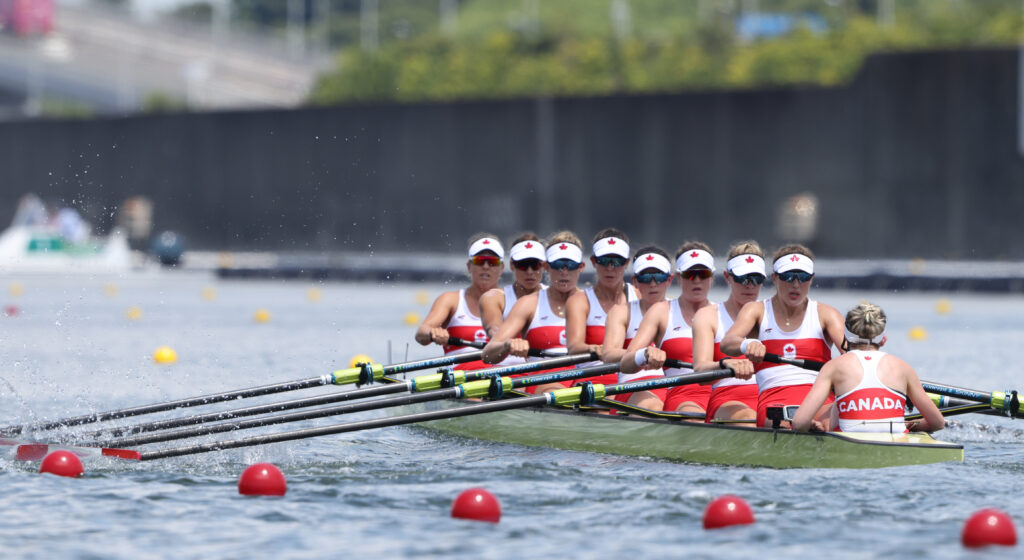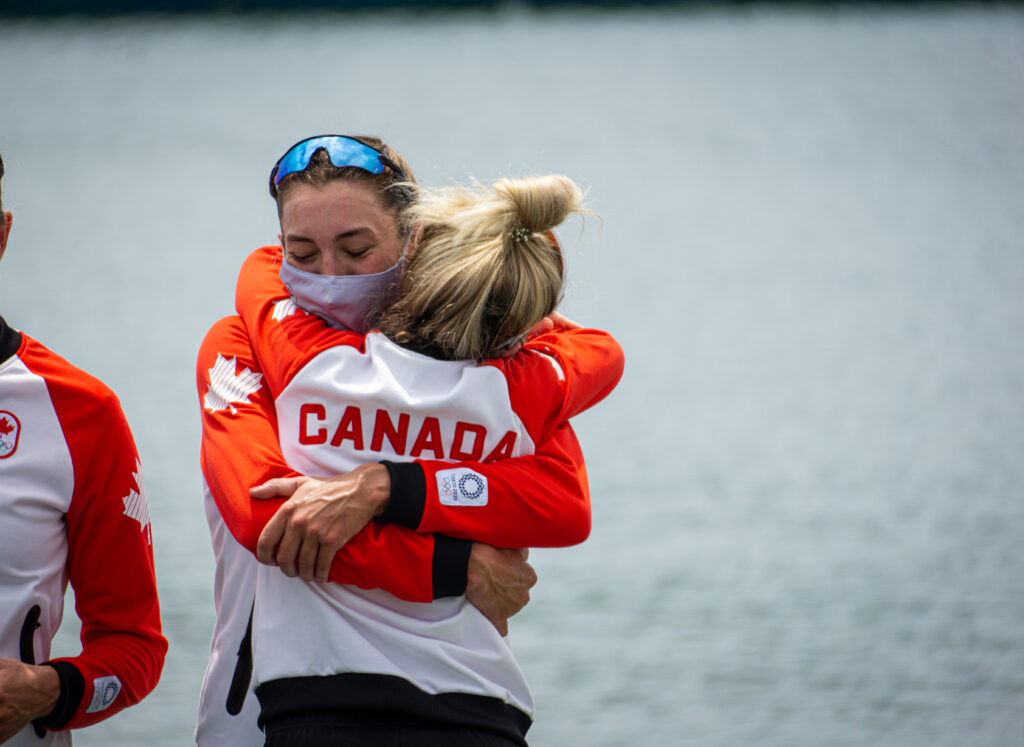
21 Dec 2021
December 2021 : Avalon Wasteneys
Rower of the Month – December 2021
Avalon Wasteneys has rowing “in her blood”, but never stepped into a rowing boat until she went to university. Now, just six years later, she is an Olympic Champion, having stroked the Canadian Women’s Eight to victory this past summer in Tokyo. World Rowing recently sat down with Avalon to chat some more.
How was your 2021 rowing season?
Well, since our only races were at the Olympic Games this year, it was short and sweet! Leading up to the Olympics we couldn’t compete internationally, so my teammates and I took the time as an opportunity to develop our team culture. As a result, it was also one of my most enjoyable rowing seasons I’ve had to date. I was able to train consistently, with very little time lost to injury or illness. I really commend my coach, Michelle Darvill, for the success of this season; she prioritised the health and well-being of her athletes above all else.
How did you first get into rowing?
In 2015 I tried out for the University of Victoria’s novice rowing team and made the switch from cross-country ski racing to rowing. My parents were both rowers in the 1980’s, so you could say I had it “in my blood,” but I didn’t actually step into a rowing shell until university. I felt I needed a change of pace from being an individual athlete my whole life and thought joining a team sport would be a productive change. At the time, it was definitely a leap of faith, but I am very grateful that I took the plunge.
After not racing internationally since 2019, you won gold this summer in Tokyo. Can you tell us more about how you prepared when you weren’t able to compete in the lead up to the games?
In the lead up to the Games, we realised that the gold medal could be anyone’s prize. No one knew the depth of the field, so we were all going in blind. We decided to turn this into an opportunity for complete internal focus. At the same time, we did a lot of internal squad racing with other boat classes on the Canadian National Team as well as what seemed like endless seat racing… By the time we got to Tokyo, the final was just another 2k, but with that added Olympic sparkle!
Can you tell us more about your A-Final at the Tokyo 2020 Olympic Games?
For us, our gold medal race at the Olympic Games was truly the epitome of a perfect race. Our crew had watched the 2008 Olympic Men’s 8+ race a few weeks prior and felt inspired by the way they commanded the race from stroke one and continued to assert their dominance down the course. After shaking the rust off in the heat and repechage, we knew that the middle 1000m was our strength, so coming into the A-final our plan was to get off the line first and then rely on our fitness and confident rhythm to dominate through the middle. As we approached the finish line, I knew we had it, but I was still overcome with shock and so many other emotions when our coxswain yelled that we had won. I knew we had a chance to win, but I hadn’t actually registered what it would feel like to be Olympic champions!

What has life been like since the Games?
Life after the Games has been similar but also very different in many ways. Sometimes I forget what we achieved (because I am still the same Avalon) but then I’ll have the occasional stranger recognise me on the street or I’ll be asked to speak at an event, and I’ll realise how much my life has changed. Internally, our accomplishment has definitely made me more confident, and I am excited to see what else I can do. Since the Games I have also been taking a break from full-time training, so it has been very fulfilling to focus on other important areas of my life that I put on hold in preparation for the Olympics.
When you aren’t rowing, what does your life look like? Are you a student, do you work, or is rowing the full-time job?
When I am not rowing (which, let’s be real, isn’t very often), I am a student at the University of Victoria. I took a couple of years off from my studies prior to the Olympics, so I am back in classes now to complete my undergraduate degree in Psychology with a minor in Anthropology. I am also fortunate enough to be an RBC Olympian, which means I am part of a two-year program with RBC that helps to develop athletes with skills beyond just sports and provides opportunities to share our stories with people all over Canada. I also enjoy spending time with my friends/family and getting to do outdoor activities in the beautiful environment we live in whenever I can.
What are your upcoming goals in rowing?
Currently, I am on a break from rowing until January, so I suppose my first goal will be simply building my fitness back. I’ve always loved the transition back into training — I view it as a fresh opportunity to examine my technical strengths and weaknesses and come back stronger than before.
Where is your favourite rowing location?
I have only had the luxury of rowing in Lucerne once (at 2018 World Cup III — my first regatta with the national team!), but the beauty of that location and course is still fresh in my mind. While training in Canada though, I enjoy rowing on Shawnigan Lake in British Columbia because you can get long rows in without spinning more than a couple times.
If you could give one piece of advice to a rower starting out, what would it be?
There will be plenty of time to be serious. Have fun with the process and find joy in the mundane while you can — it’ll make the long rows fly by much faster and help develop important relationships with teammates.
What’s the most memorable piece of advice that has been said to you?
Same as the advice I’d give, my father always told me to have fun. It’s a simple reminder that even if something is tough, it doesn’t mean it can’t have moments of joy. In fact, I think some of my fondest memories are from laughing or being silly with my teammates during the most grueling training sessions.
Do you have a mentor or athlete that you admire?
There are many people that I admire and so many people that have gone out of their way to help me over the years. I have immense respect and gratitude towards our coxswain, Kristen Kit, who made a point of both pushing me and believing in me ever since my first training session with the team in 2017. Our relationship has developed into a trusted friendship and I was so honoured to be her stroke seat at the Olympics. The second person is my teammate, Caileigh Filmer, who won bronze in the Women’s Pair in Tokyo; Caileigh briefly rowed with the University of Victoria varsity team and so she was one of my first examples of dedication and hard work in the rowing world. She inspired me to be my best and was always there to celebrate my successes or pick me up when I fell (literally — I didn’t have a car for a long time!).

To follow Avalon on her journey, check out her Instagram profile.

